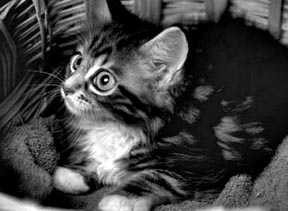Longing for the pitter-patter of tiny paws? Adoption is a promise for life – and thats longer than you might think. We can hope for 15 to 18+ years, with good genes, preventative healthcare, and protection from outdoor dangers, says Ilona Rodan, DVM, director of the Cat Care Clinic in Madison, Wisconsin. Theres even a growing number of 20+-year-old cats these days due to improved senior care programs.

288
Before falling in love, take a good look at your home, schedule, and lifestyle. If there are very young children in the household, its best not to adopt a kitten less than 4 months of age, advises Rodan. Small children are often unable to understand the meaning of gentle handling. In addition, children and immunosuppressed people (cancer, HIV, transplant recipients) have a much greater chance of contracting zoonotic diseases (diseases spread from animals to humans) from a kitten. A calm, gentle adult cat is a much better choice.
For the Good of All
Already have cats? Consider their needs too. Some cats (just like people) are more social than others and accept new additions easily. There are households where one or two cats are enough, notes Rodan, who is board certified by the American Board of Veterinary Practitioners with a specialty in feline practice. As a general rule, the greater the number of cats, the greater the increase in stress and behavioral problems, she says. But if people work long hours, its great for kittens and cats to have feline friends so theyre not lonely or bored – plus, they get more exercise!
But for a single person or someone who spends lots of time at home and would benefit from strong bonding with a cat (e.g., a housebound elderly person), a mellow, loving older cat is preferred over a kitten or multiples.
Making the Right Choice
Give careful thought to where youll get your kitten and if shell be a mixed or purebred cat. Theres a better chance of getting a cat free of infectious diseases from a good cattery, notes Rodan. However, purebred cats are more likely to have genetic problems, and some catteries have chronic or severe infectious diseases that are difficult to eliminate. Seek out reputable breeders, and ask questions about genetic and infectious diseases.
Of course, notes Rodan, theres the issue of whether one should adopt a purebred kitten when so many unwanted kittens and cats are still euthanized every day. The great news is that theres now excellent help from adoption counselors at shelters to help you choose a well socialized kitten or cat.
Temperament is an important consideration. Whether the kitten is well socialized or not depends upon whether the mother is well socialized to humans and if the kitten was with her during the socialization period (2 to 7 weeks of age), notes Rodan. Interestingly, temperament is primarily based on the fathers temperament, so you have a better chance knowing what the kittens disposition will be by meeting both mother and father – which is more likely with a good breeder.
Safety First
Before kitty comes home, eliminate hazards. Get rid of poisonous plants; store chemicals, medications, and toxins in secure cabinets; and repair window screens. Keep kitty away from garbage, table scraps, electrical cords, ibuprofen, acetaminophen, antifreeze, and small objects like coins, rubber bands, tiny toys, and paper clips. Dont let her play with dental floss, string, thread, ribbon, or yarn; if swallowed, these can cause internal injury.
If kittys joining resident cats, separate the new kitty and introduce him to other cat(s) gradually over a period of about two weeks. Provide extra litter boxes, plenty of space, and daily individual attention. Increase space by adding climbing structures, cat trees, and perches. Cats need a lot of space, and theres evidence that letting cats go outdoors helps, says Rodan. However, we need to weigh the risks of outdoor dangers – special enclosed structures built outdoors give cats the best of both worlds. (See CatWatch, April 2002.)
Kittenhood is fleeting, and physical, mental, and emotional development happens at a breathtaking pace. By 10-12 weeks, the lately wobbly toddler blooms into a confident leaper endowed with grace, agility, and splendid balance. By six months, shes fully independent, able to hunt and fend for herself. And by that age,
many cats are sexually mature – dont forget to spay or neuter!
In deciding when and whether to adopt, you should contact your veterinary hospital – your best advisor. Many veterinary hospitals now have pre-adoption or pet selection programs to help people recognize if and when its a good time for them to adopt a kitten and to advise them what to look for in a new kitten or cat, says Rodan. The main thing is that they have realistic expectations for the new adoptee.



